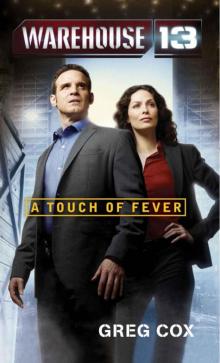Star Trek: The Eugenics War, Vol. 1 Read online
Page 3
The poor sot continued to grin idiotically, completely oblivious of the hot water he had mistakenly landed into. Probably completely harmless, Kilheffer thought, with just a twinge of regret, but what did that matter? Someone had to take the blame for tonight's fiasco.
Chances were, this innocent dupe would not see the light of day for a long, long time.
CHAPTER TWO
811 EAST 68TH STREET, APT. 12- B
NEW YORK CITY
UNITED STATES OF AMERICA
MARCH 13, 1974
THE SWIRLING BLUE FOG COMPLETELY FILLED THE EMPTY, VAULT-SIZED chamber. Empty for the moment, that is. Seconds later, a breathless young woman emerged from the mist, followed by a somewhat older man carrying a cat. Home sweet home, Roberta thought as she stepped out of the vault into the office beyond. Overhead lights came on automatically, revealing a tidy office decorated with contemporary furniture. Framed paintings, mostly on a feline theme, hung on the walls, except where cedar bookshelves occupied one entire wall. Roberta breathed a sigh of relief; it was good to be back.
She was still winded from their headlong flight from the East German troopers. Only seconds before, she and Seven had been running down that lonely side street in Berlin, with the determined Grepos hot on their heels; good thing Seven had managed to transport them all out of there just in time. Those guards are probably still scratching their heads over our abrupt disappearance, she reflected. Serves them right for shooting first before even trying to find out who we were.
Its timely rescue complete, the shimmering azure mist faded. A heavy iron door swung closed, sealing the vault away for the time being. Wooden panels slid out from hidden recesses on both sides of the vault, concealing the sturdy, impenetrable door behind three shelves of cocktail glasses. Within moments, all traces of the secret fog chamber had vanished from sight, so that Gary Seven's private office now looked entirely ordinary, and deceptively devoid of any eyecatching alien hardware.
Isis leaped from Seven's arms, landing nimbly on the plush orange carpet, where she promptly set to work licking the smell of East Berlin from her fur. His arms now free, Seven extracted a plain manila envelope from the interior of his jacket, laying the package upon a polished obsidian desktop. “A good night's work,” he commented, loosening his tie as he turned toward Roberta. “By the way, who was the rather agitated-looking fellow with the knife?”
“Oh, just your run-of-the-mill mad slasher.” She shrugged out of her heavy winter coat, then plopped down on the comfy orange couch against the far wall. Beneath the coat, she wore a red turtleneck sweater and a pair of faded bluejeans. “Too bad we had to leave that creep behind.”
“I suspect the East German authorities will deal quite harshly with him,” Seven assured her, “especially if they make him a scapegoat for our unauthorized visit to the Russian Embassy.” He removed his jacket and hung it on the back of the black suede chair behind his desk. “In any event, we had more important things to do than respond to a random street crime. Catching a minor psychopath was not what our mission was about.”
I guess so, Roberta thought, although she didn't like the idea of not knowing what ever happened to Jack. Oh well, I'm sure he'll get his just deserts eventually.
Seven sat down at his desk and removed a thin sheaf of papers from the manila envelope. His brow furrowed in concentration as he studied the documents he had just “borrowed” from the Russian Embassy. Judging from the scowl on his face, he didn't like what he was reading.
Roberta considered pointing out to Seven that it was nearly eightthirty in the evening, Eastern Standard Time. Frankly, she was inclined to call it a day and head home to her apartment in the West Village. Instead she switched her watch back to New York time and waited for Seven to finish reviewing the purloined papers. For better or for worse, irregular hours were part of the job, even if zapping around the world via radioactive smoke confused the heck out of her body's circadian rhythms. Do I want dinner or breakfast or what? she speculated, leafing through a copy of People magazine she found on the endtable next to the couch. Hmmm, I wonder if this Jaws movie is going to be any good . . . ?
She was just finishing up yet another gloomy article on the Watergate scandal when Gary Seven looked up from the Russian documents. He stared blankly at the framed paintings on the wall, obviously deep in thought. “Bad news?” she prompted him; despite their close association since the late sixties, her enigmatic employer could still be maddeningly tight-lipped at times.
“Perhaps, Ms. Lincoln,” he replied. Concern weighed down his words and deepened the solemn lines of his face. “According to these classified reports, the Russians have misplaced several of their top geneticists and biochemists. Pavlinko, Lozinak, Malinowycz . . . close to a half-dozen of the top Soviet researchers in the field have gone missing in the last year or so.”
“Maybe they defected?” Roberta suggested. “Possibly, but to whom? I know for a fact that none of the missing scientists have been recruited by the Americans or any of the other major Western powers.” Seven eyed Roberta gravely. “Unfortunately, these latest disappearances are only part of a much larger and more ominous picture. Many of the world's top scientists, particularly those specializing in applied genetic engineering, have seemingly dropped off the face of the Earth.”
Seven paused to let Roberta assimilate what she had just heard. Genetic engineering? she wondered. She was familiar with the basic idea, from newspaper articles and the occasional sci-fi novel, but she'd thought that modern science was still years away from actually being able to tamper with anybody's DNA. Then again, most people didn't know about extraterrestrial social workers or instantaneous matter transmission either. “So what do you think this is all about?” she asked Seven apprehensively, not entirely sure she wanted to hear the answer. “It's unclear whether the missing scientists have been abducted or if they have vanished of their own free will,” Seven stated, “but I have to assume that some form of ambitious genetic-engineering project is in the works.” The worry lines on his craggy face deepened noticeably. “This could have very disturbing consequences. Your people are nowhere near ready for that sort of control over your own genetic makeup.”
How come whenever the human race screws up, they're suddenly “my” people? Roberta thought, not for the first time. Seven had an annoying tendency to forget that he was human, too, even if he and all his ancestors had been raised on some weird alien planet somewhere. She couldn't resist the temptation to tweak Seven a little. “Correct me if I'm wrong,” she began, “but aren't you the product of generations of selective breeding and fancy genetic tinkering?”
Her pointed observation did not faze Seven; heck, it didn't even scratch the surface of his preternatural composure. “That's an entirely different situation,” he replied with complete conviction. Self-doubt was not numbered among Gary Seven's personal failings. “My sponsors know what they are doing.”
“As opposed to us primitive, twentieth-century Earthlings?” Roberta asked, trying to muster up a show of righteous indignation of behalf of the rest of the human race. She crossed her arms semi-belligerently and beamed a no-nonsense stare in her boss's direction.
“Exactly,” he confirmed matter-of-factly. There was a time, back when she first hooked up with Seven, when she might have accepted an answer like that, deferring to Seven's superior knowledge of such matters, but not anymore. “No way,” she objected. “You have to do better than that. Why shouldn't we humans improve our chromosomes if we feel like it? What's the big crime?”
To her satisfaction, and mild surprise, Seven appeared to give her pestering questions serious consideration. “The problem, and the danger, Ms. Lincoln, is genocide, of one form or another, and the very real possibility of genetic warfare. Galactic history teaches us that once a species succeeds in creating a ‘superior’ version of themselves, it's then one very short step to viewing the rest of the species as unworthy, obsolete, and, ultimately, disposable. Just as their baseline contemporaries of
ten regard the genetically or cybernetically augmented as monsters to be destroyed.” He shook his head sadly. “It's an ugly, tragic situation that has devastated more civilizations and species than I like to recall. The Voixxians. The Ryol. The Minjo. The Borg. . . .”
“Okay, I get it, I guess,” Roberta said, surrendering for the time being. “Thanks for the history lesson.” In some ways, though, Seven's explanation was more frustrating than satisfying. “It's not exactly fair, you know. You're always winning arguments by citing incidents on planets I've never heard of, and can hardly check up on.” She eyed him quizzically from across the room. “How do I know you don't make up half of this stuff?”
Seven looked backed at her with amused gray eyes. “On that, Ms. Lincoln, you'll just have to trust me.” Perched on the back of the plush chair nearby, Isis mewed in agreement.
No surprise there, Roberta thought ruefully. Sometimes she suspected that the ever-present black feline knew more about what Seven was up to than she did; the rest of the time she was sure of it. Yeah, but I've got opposable thumbs and she doesn't, at least not at the moment.
Even after six years of working with Seven ( and Isis), she knew frustratingly little about the mysterious aliens behind this little operation, just that they had snatched up his great-great-great-ancestors some six thousand years ago, trained their offspring for umpteen generations, then sent good old Supervisor 194 back to Earth to keep his fellow Homo sapiens from starting World War III. Whenever she asked Seven about his superiors Up There, he told her that she didn't need to know anything more, that greater knowledge of the Aegis ( as he sometimes called them) would not assist her in the field, and might actually compromise the alien's grand design should the information fall into the wrong hands. Well, maybe, Roberta mused; just the same, she would like to know whether she was working for a bunch of superintelligent bugs or birds or big giant brains. Just so long as they don't have tails or whiskers , she thought, with a suspicious glance at Isis.
One of these days, she vowed, she would pry the full scoop out of Seven. Now, however, did not seem like the right time to press the issue. The boss had more pressing matters on his mind, like these inexplicably AWOL chromosome counters.
Seven finally glanced at his own wristwatch. “All right,” he said reluctantly. “There's nothing more we can do tonight. Starting tomorrow, though, finding out where all these scientists have gone to is our top priority.” He leaned back into his chair, massaging his forehead with his fingers in a rare moment of human vulnerability and fatigue. “With any luck,” he sighed, “we can nip this dangerous experiment in the bud before it goes too far.”
Roberta figured she was probably still missing some of the deeper implications of this whole Mad Scientist business that had Seven worried, but she hoped he was right anyway. About it not being too late, that is.
CHRYSALIS BASE
LOCATION: CLASSIFIED
Selective breeding is effective as a means of evolution, but it takes too long, especially where human gestation periods are involved. Tedious as it sometimes was, deliberate genetic manipulation sped up the process immeasurably, or so Dr. Sarina Kaur kept reminding herself as she pruned yet another collection of human embryos. With luck, there won't be too many rejects, she thought, studying each embryo individually beneath a powerful electron microscope.
The sterile, air-conditioned laboratory resembled a gleaming, hightech kitchen. Black acid-proof counters shined like polished obsidian against bright mango-colored walls. Equipment ranging from simple column chromatography setups to sophisticated liquid scintillation counters sat atop the counter, alongside agar-filled petrie dishes and folded nitrocellulose filters. Spare test tubes, beakers, and pipettes were stacked neatly in open shelves above the counters, while a shining steel stool gave Kaur someplace to rest her legs while she inspected the embryos. A traditional Indian raga played softly in the background, soothing her nerves over the course of a long day's work.
Despite her fatigue, the thirtyish scientist felt an undeniable sense of accomplishment. The two dozen embryos arrayed upon the counter, each one no more than a few millimeters long and each suspended in a sterile dish containing an artificial growth medium of her own invention, were the end of a long and meticulous process of elimination and experimentation, expressly designed to create human embryos genetically superior to those created through the random genetic shuffling of ordinary reproduction.
The process had begun by inducing superovulation in all of the project's female volunteers, including herself. The large and diverse assortment of eggs yielded by this procedure had then been inseminated artificially and allowed to incubate at a temperature of precisely thirty-seven degrees centigrade, i. e. body temperature. Following fertilization, the eggs had been carefully examined for a wide variety of genetic defects or abnormalities, with all unsuitable eggs immediately terminated and disposed of. Kaur prided herself on developing, with the aid of her colleagues, selection criteria far more stringent than those employed by simple biology. To improve on Nature, after all, it was necessary to be harsher and more ruthless than Nature, so that only the most promising genetic combinations would survive.
The result of this early screening, however, merely guaranteed offspring free of certain inherited defects. A laudable outcome, to be sure, but one that fell far below the ultimate ambitions of the project. It was not enough to simply produce outstanding examples of conventional humanity; the Chrysalis Project aspired to create a new breed of man and woman, markedly superior to any who had existed before. To do so required adding new information and instructions to the genetic blueprint encoded in each egg's DNA.
The conventional wisdom of the time held that modern science was still decades away from performing such procedures with any hope of success, but, here at Chrysalis, the combined brilliance of Kaur and her associates, free from governmental interference and the timidity of the general public, had already taken the art and science of genetic engineering much further than the outside world could possibly imagine Someday, she reflected, the world will be astounded to discover all that we have been able to accomplish here.
Take, for example, the unprecedented way they had learned to clone multiple copies of each surviving egg, thus increasing the odds of successful hybridization later on. Conventional science maintained that a fertilized egg could only be cloned twice before expiring, yet Kaur herself had developed a technique for producing dozens of identical copies of a single egg. That was the key, she recalled; invariably, applied genetics involved a certain degree of trial and error, heredity being fundamentally a matter of probabilities. But by generating so many ideal eggs to work with, the chances of achieving the desired genetic result increased dramatically—especially when the biological geniuses of the project knew exactly what modifications they wanted to make to the standard human genome.
Fragments of specialized DNA, built from scratch from the appropriate amino acids, then multiplied by polymerase chain reactions, were spliced into bacterial plasmids, which acted as vectors to transmit the recombinant genes to the nucleus of the egg itself. Not every plasmid-borne gene successfully infiltrated the egg's DNA, let alone at precisely the right spot in the sequence of codons, but that's what all those multiple copies were for. Enough hybridized eggs made it through the secondary screening process to provide a suitable number of samples for the next round of genetic augmentation.
In all, the process currently involved the introduction of seven distinct improvements to the basic human genotype. One such modification accelerated the formation of critical neural pathways, thus increasing intelligence. Another slight resequencing of the base pairs of a specific human gene had been found to substantially improve the efficiency of the lungs and respiratory systems, while the addition of a single new gene, adapted from one located in the DNA of the African gorilla, caused an increase in muscular density and resilience.
Now, after weeks of exacting effort, including the use of microscopic radioactive probes
to confirm the presence of selected genes in various batches of modified eggs, only one last trial remained for this, the most recent crop of genetically engineered embryos. Careful screening of hundreds of test samples had winnowed the selection down to a mere two dozen eggs, which had then been allowed to develop into the embryos currently awaiting Kaur's final inspection. Of these candidates, only those she judged suitable would be implanted in the surrogate mothers who had agreed to carry the babies to term.
Only the best of the best of the best for our proud corps of moms-to-be, she mused, smiling. Many of the women involved were simply peasant women paid a generous sum for their cooperation and silence; since the surrogates made no genetic contribution to the children they carried, the project didn't need to be too picky when it came to recruiting extra wombs. As long as the women stayed healthy and drug-free, and agreed to be monitored on a daily basis, they were good enough to serve as human incubators for the vastly superior beings gestating within them.
One of these days we really have to develop some workable artificial wombs, Kaur reflected. That would place yet one more crucial stage of human development under deliberate scientific control, not to mention sparing the project the burden of having to constantly recruit new surrogate mothers. She patted her abdomen, already bulging slightly beneath her voluminous white lab coat; in the meantime, she, along with nearly every other female member of Chrysalis, was glad to volunteer her own body as a biological petri dish in which the future of humanity was growing day by day.
She removed a cell sample from Subject # CHS-453- X and inspected it through the electron microscope, paying particular attention to the chromosomes as they paired off during cell division. Something didn't look quite right about one pair, so, frowning, she increased the magnification. Through the lens of the microscope, the paired chromosomes looked like segmented black worms joined at their midsections so that each pair seemed to form a squiggly X shape. Except for one pair, that is. To Kaur's chagrin, she saw that a piece of one chromosome seemed to have broken off and reattached itself to the wrong arm of the X, producing a distinctly lopsided and unsymmetrical set of chromosomes.

 Q-Space
Q-Space Godzilla - the Official Movie Novelization
Godzilla - the Official Movie Novelization War for the Planet of the Apes: Official Movie Novelization
War for the Planet of the Apes: Official Movie Novelization Underworld: Evolution
Underworld: Evolution Underworld
Underworld Rise of the Lycans
Rise of the Lycans 04 - Rise of the Lycans
04 - Rise of the Lycans X-Men and the Avengers: Search and Rescue
X-Men and the Avengers: Search and Rescue Child of Two Worlds
Child of Two Worlds Welcome to Promise City
Welcome to Promise City The Librarians and the Mother Goose Chase
The Librarians and the Mother Goose Chase Dragon's Honor
Dragon's Honor 03 - Evolution
03 - Evolution DC Comics novels--Batman
DC Comics novels--Batman X-Men and the Avengers: Lost and Found
X-Men and the Avengers: Lost and Found Foul Deeds Will Rise
Foul Deeds Will Rise 02 - Blood Enemy
02 - Blood Enemy Terminator Salvation: Cold War
Terminator Salvation: Cold War The Weight of Worlds
The Weight of Worlds The Antares Maelstrom
The Antares Maelstrom Warehouse 13: A Touch of Fever
Warehouse 13: A Touch of Fever Underworld: Blood Enemy
Underworld: Blood Enemy The Rise and Fall of Khan Noonien Singh
The Rise and Fall of Khan Noonien Singh 01 - Underworld
01 - Underworld The 4400- the Vesuvius Prophecy
The 4400- the Vesuvius Prophecy Assignment: Eternity
Assignment: Eternity The Eugenics Wars, Vol. 2: The Rise and Fall of Khan Noonien Singh
The Eugenics Wars, Vol. 2: The Rise and Fall of Khan Noonien Singh The Dark Knight Rises: The Official Novelization
The Dark Knight Rises: The Official Novelization The Bestseller Job
The Bestseller Job X-Men and the Avengers: Friend or Foe?
X-Men and the Avengers: Friend or Foe? Marvel Classic Novels--X-Men and the Avengers
Marvel Classic Novels--X-Men and the Avengers STAR TREK: TOS - The Eugenics Wars, Volume Two
STAR TREK: TOS - The Eugenics Wars, Volume Two STAR TREK: TOS - The Eugenics Wars, Volume One
STAR TREK: TOS - The Eugenics Wars, Volume One The Black Shore
The Black Shore Man of Steel: The Official Movie Novelization
Man of Steel: The Official Movie Novelization Loose ends r-1
Loose ends r-1 Legacies
Legacies The Eugenics Wars, Volume Two
The Eugenics Wars, Volume Two Star Trek: The Original Series - 148 - The Weight of Worlds
Star Trek: The Original Series - 148 - The Weight of Worlds Star Trek: The Original Series: The Rings of Time
Star Trek: The Original Series: The Rings of Time Godzilla--The Official Movie Novelization
Godzilla--The Official Movie Novelization Star Trek: The Original Series - 160 - Foul Deeds Will Rise
Star Trek: The Original Series - 160 - Foul Deeds Will Rise Terminator Salvation: Cold War ts-3
Terminator Salvation: Cold War ts-3 Star Trek: The Original Series: Miasma
Star Trek: The Original Series: Miasma Star Trek: The Original Series: No Time Like the Past
Star Trek: The Original Series: No Time Like the Past Child of Two Worlds (Star Trek: The Original Series)
Child of Two Worlds (Star Trek: The Original Series) THE 4400® WELCOME TO PROMISE CITY
THE 4400® WELCOME TO PROMISE CITY Star Trek: The Original Series: The Rings of Time (star trek: the original series)
Star Trek: The Original Series: The Rings of Time (star trek: the original series) To Reign in Hell: The Exile of Khan Noonien Singh
To Reign in Hell: The Exile of Khan Noonien Singh Star Trek: The Eugenics War, Vol. 1
Star Trek: The Eugenics War, Vol. 1 The Q Continuum
The Q Continuum